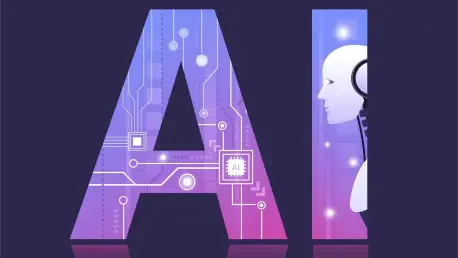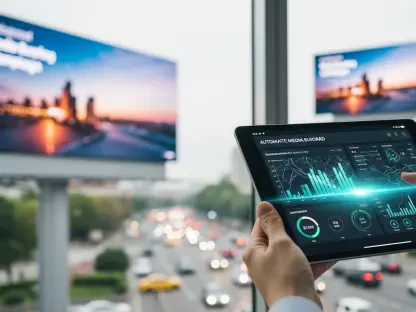In today’s rapidly evolving digital landscape, Artificial Intelligence (AI) has emerged as a powerful catalyst in reshaping the dynamics of social media marketing, prompting businesses to rethink their strategies. Since its inception, AI has moved beyond simple automation and analytics, advancing to a more sophisticated level where creativity and innovation are at the forefront. While AI’s use in generating content and targeting audiences has already shown remarkable results, its potential to enhance creativity within social media marketing sparks both enthusiasm and ethical debates. As AI technologies become increasingly complex, brands endeavor to harness its capabilities to produce ingenious campaigns that resonate with various audiences, all while maintaining authenticity. This evolution necessitates a careful balance between utilizing AI’s efficiencies and preserving the human touch. The following exploration delves into the multifaceted impacts of AI on creativity in social media marketing, highlighting its practical applications and addressing the ethical considerations accompanying it.
AI’s Role in Transforming Marketing Strategies
Artificial Intelligence is reshaping marketing strategies at an unprecedented pace by offering tools that transcend traditional methods and make data analysis more efficient. AI’s proficiency allows marketers to streamline processes, predict consumer trends, and tailor campaigns to specific audiences, ultimately enhancing performance and engagement. Marketers are now turning to AI to gather insightful analytics about consumer behavior, preferences, and purchasing patterns. From identifying the best times to post content to predicting future trends, the data-driven strategies enabled by AI transform marketing initiatives from hesitant guesses into calculated endeavors. AI’s role in hyper-targeting advertising content ensures increased relevance, maximizing the engagement between brands and consumers. Yet, the core of AI’s transformative power rests in its ability to elevate creative processes, allowing marketers to explore new horizons in content creation and audience interaction.
Notably, content creation has received a remarkable boost from AI, enabling marketers to generate material efficiently and at scale. AI-powered tools such as natural language processing and image recognition facilitate the production of diversified content, ranging from written text to dynamic visuals, which can significantly enhance marketing campaigns. These innovations accommodate extensive creative possibilities by automating the meticulous details that often constrain human creativity. Encouraging streamlined workflows and increased productivity, AI assists teams in focusing their efforts on conceptualizing fresh ideas and crafting distinctive narratives, rather than being mired in repetitive tasks. Despite potential reductions in manpower for specific tasks, AI’s influence fosters innovative thinking, positioning creativity as a strategic asset that drives social media marketing forward in an era of digital communication.
Emerging Applications and Innovations
Beyond data analytics, AI has introduced several innovations that redefine marketing campaigns, each offering unique benefits and possibilities for creative advancement. Among these are the rapid production capabilities that AI provides, expediting the creation of content tailored to match branding requirements and consumer interests. AI’s generative technologies, including image generation and text synthesis, forge new standards in content creation, allowing marketers to present captivating visuals and articulate messages that resonate well with targeted segments. Tools like DALL-E and Midjourney enable the seamless generation and optimization of branded imagery, evoking emotions and enhancing storytelling elements that captivate social media audiences. These tools free creative teams from the constraints of conventional design, empowering them to explore artistic compositions that capture and engage audiences at extraordinary levels.
Additionally, sophisticated AI applications have fostered the development of virtual influencers—digital personas that charm audiences with their lifelike appearances and curated interactions—and they serve as captivating extensions of genuine community engagement. By leveraging virtual influencers, brands gain the flexibility to craft perfect scenarios without being bound by the limitations of human unpredictability, offering precise control over brand reputation and consumer experience. This enhanced creative control makes virtual influencers a compelling option, although the technology also imposes ethical considerations related to authenticity and the necessity for genuine human connection. Importantly, marketers have recognized the importance of balancing artificial associates with human influencers to claim emotional bonds fostered through authentic storytelling and relatable interactions. Conversational AI and chatbots also broaden engagement strategies, enabling interactive dialogues that support customer service notifications, content promotion, and brand storytelling. As AI facilitates creativity, it inspires new roles in digital marketing, ensuring innovation remains dynamic and responsive to audience needs.
Ethical Considerations and Transparency
As AI continues its advancement within social media marketing, inevitable ethical dilemmas and transparency issues arise, prompting scrutiny and necessitating responsible governance. The integration of AI technologies introduces privacy concerns, driven by the extensive data collection and analytical processes required to facilitate its operations. While AI-driven strategies depend on data to successfully target and engage consumers, the transparency of data collection practices remains a pressing issue. Companies must ensure clarity in disclosing data usage to ensure compliance with evolving privacy regulations and foster trust with users. Concerns also stem from AI-generated content potentially blurring the lines between human-formed and computer-generated creations, raising questions of authenticity and the propagation of misinformation. Deepfakes and fabricated media content have become more accessible, presenting risks of misuse and reinforcing the need for ethical intervention.
Moreover, AI systems are prone to embedding the biases present in training data, which can lead to aggravated representations and distortions. Instances of gender stereotyping or marginalization in algorithmically curated content accentuate the necessity for vigilant oversights and corrective actions to uphold equitable content distribution. Conversely, AI’s prowess can be harnessed to inhibit harmful narratives by moderating offensive content and identifying human rights violations in digital spaces. Dancing on the fine line between bias elimination and technological progression encourages the adoption of sophisticated approaches that address ethical challenges without compromising AI’s innovative potential. As AI solidifies its presence, brands are tasked with promoting transparency in their processes, ensuring informed consumer interactions, and fostering inclusive, ethical content that values authenticity and storytelling.
The Future of AI in Social Media Marketing
Artificial Intelligence is revolutionizing marketing strategies, offering tools that surpass traditional methods and enhancing data analysis efficiency. With AI, marketers can optimize processes, forecast consumer trends, and customize campaigns for specific audiences, leading to improved performance and engagement. Leveraging AI, marketers can access insightful analytics regarding consumer behavior, preferences, and purchasing patterns. AI turns marketing plans from mere guesses into precise strategies, enabling marketers to determine optimal content-posting times and predict future trends. By hyper-targeting advertisement content, AI increases relevance and heightens engagement between brands and consumers. The transformative power of AI lies in its ability to elevate creative processes, empowering marketers to explore new possibilities in content creation and audience interaction.
AI has notably enhanced content creation, allowing marketers to produce material efficiently at scale. Tools powered by AI, such as natural language processing and image recognition, facilitate the generation of varied content—from text to vibrant visuals—thereby boosting marketing campaigns. These developments automate intricate details, freeing human creativity from constraints. By streamlining workflows and boosting productivity, AI enables teams to focus on developing fresh ideas and crafting unique narratives rather than repetitive tasks. While it might reduce manpower for some activities, AI encourages innovative thinking, making creativity a strategic asset that propels social media marketing in the digital age.









